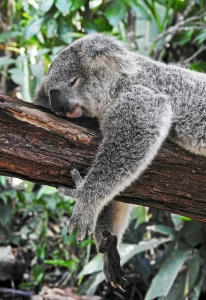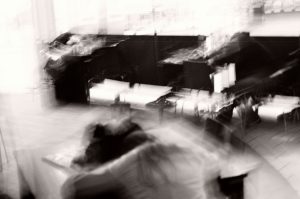What We Treat
Acupuncture & Chinese Medicine for Nightmares

I’m not sure if what my toddler experiences qualifies as nightmares—she’ll occasionally yell out in her sleep—defiant demands, such as: “I don’t want one! I want TWO!” or, “No, put me down!” which my wife and I imagine are healthy reenactments of infuriating boundaries one of us had to regularly and/or recently hold with her.
For most adults, with greater awareness, a resume of more hardship to induce greater fears, real traumas, and fabricated neuroses, nightmares can be much scarier than being limited to one cookie. Per usual, (in Chinese medicine) they can be the result of a variety of mechanisms (none of which are mutually exclusive to the obvious psychological aspect), however all with one end result: “(Jue Yin) Blood Deficiency.” What is “Jue Yin Blood Deficiency?”
Generally, this means a person is lacking in fluids, such as blood and organ fluids, as well as inhibitory hormones and/or neurotransmitters, such as melatonin, dopamine, or serotonin. Without ample inhibitory substances, excitatory substances have no anchor—they will flare, whether in the form of emotional dysregulation, insomnia, night sweats, or NIGHTMARES.
I read one small study that demonstrated that people who suffer with nightmares also have a blunted cortisol awakening response, which is to say they feel exhausted upon waking, even after a good night’s sleep. Another study showed that specifically ADHD patients are three times more likely to report nightmares. Both instances suggest neuroendocrine disruption due to a deficit of stimulatory hormones, which might seem counterintuitive, as we might suspect that someone in the throes of a nightmare must be overstimulated. In fact, Chinese medicine and modern neuroscience seem to agree that these patients are in fact under-stimulated.
Activating hormones and neurotransmitters do not only activate the mind—they also stimulate the organs, via the hypothalamic pituitary axis, to properly do their jobs, part of which is to produce more substances to harmonize chemical balance in the body.
Stress can dry out these substances, as can poor sleep habits or poor diet. If stress is the cause it is advisable to seek therapy and/or meditation or some kind of spiritual context to reframe one’s suffering. Acupuncture would likely revolve around the gallbladder, liver, stomach, and pancreas vessels. Herbal medicine might revolve around bupleurum, ginseng, licorice, and/or pinellia root.
If someone’s diet is lacking in proper fat or protein this can lead to hypoactivity. Acupuncture might revolve around the stomach, pancreas, and liver vessels, plus the kidney instead of the gallbladder. Herbs might revolve around red dates, rehmannia root, angelica, and/or aconite.
If someone’s diet is excessively fatty or rich, this obviously creates inflammation that suffocates the organs, which causes the illusion of hypoactivity—in fact the organs are working overtime, exhausted as a result. Acupuncture would definitely revolve around the gallbladder and stomach vessels, probably the large intestine, as well as points on the abdomen itself. Herbal medicines might revolve around coptis root, gardenia fruit, and bamboo paper. In call cases points along the scalp above the hypothalamus and/or amygdala can be helpful.
If you or someone you know deals with any kind of nightmares or sleep disturbances, Chinese medicine can absolutely help… unless you live on Elm St. Wishing everyone restful sleep!
Chinese Medicine on Fainting, Dizziness

A friend of mine recently expressed having experienced great bouts of dizziness and fainting during the third trimester of her last pregnancy, which was in the dead of summer and was thus not surprising. I felt bad to hear of her struggles, but grateful that it inspired an idea for a new entry, on how Chinese medicine views fainting and dizziness, whether in pregnancy or not, and how we can treat or prevent it.
As with any Chinese medical diagnosis, the specifics get complicated, but we can still relatively easy to simplify into a couple of broad strokes. With any manifestation of dizziness, whether orthostatic, vertigo, passing out, or anything else, we are considering patterns of either blood deficiency, dampness, or a combination of the two, the latter of which obviously being the most difficult to treat. The final one is where your toddler at home forces you to “dance” with her around the house by spinning endlessly, for which there is no cure.
Blood Deficiency: More common in vegans, vegetarians, and pescatarians (most likely descending order), more common in women (especially while pregnant), the elderly, or anyone on long-term medications, which compromise the body’s absorption and capacity to produce blood. There is either a lack of cerebrovascular fluid or its flow and the head becomes faint.
Recommended treatment is herbs and moxibustion (acupuncture not as effective here), red meat or eggs, and earlier bedtimes.
Dampness: More common with obesity, more common in men, and/or people who consume a lot of alcohol, sugar, dairy, or raw foods. The microbiome grows congested with fluid retention, so the pathway by which our cellular energy carries healthy fluids to the brain is obstructed. “The clear yang qi cannot rise,” as we say, and our clarity or stability suffer.
Recommended treatment is minimizing all of the aforementioned foods, herbal medicine for 1-3 weeks to purge fluid retention, and acupuncture, especially along the vertigo line along the scalp located directly above the top of the ears. Note, this point will not be as effective on blood deficiency patterns, who are suffering a pattern of “deficiency,” not “excessive damp,” which responds better to aggressive manual treatment. As for self-care, drink hot ginger tea and black teas until symptoms subside.
Combination Blood Deficiency/Dampness: This is most common in pregnant women and very difficult to treat, because to nourish blood we must generate fluids, but to resolve dampness we must purge it. Not to mention the fact that we must be careful with purging fluid retention in pregnant women, since the fetus is ultimately a form of fluid retention—albeit an adorably magical one.
Dizziness and vertigo are serious conditions, not generally life threatening, although potentially dangerous when leading to the physical risks that accompany fainting. As always, Chinese Medicine can have much to offer in the way of hands-on treatment, internal medicine, and recommended self-care.
When in doubt: red meat, eggs, ginger tea, good rest, and steamed vegetables for the dampness.

